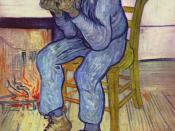Everybody's mood varies according to events in the world around them. People are happy
when they achieve something or saddened when they fail a test or lose something. When
they are sad, some people say they are 'depressed', but the clinical depressions that are
seen by doctors differ from the low mood brought on by everyday setbacks. Psychiatrists
see a range of more severe mood disturbances and so find it easier to distinguish these
from the normal variations of mood seen in the community. General practitioners (GP's) need to
be sensitive enough to distinguish emotional reactions to setbacks in life from anxiety
syndromes, somatisation and clinical depressions. The general idea is that anxiety
disorders, depressive episodes, somatisation and adjustment reactions are all different
entities, but in practice it is not always that clear-cut. Major depression, as defined by
psychiatrists, is unfortunately relatively common.
What is depression?
The term 'affect' refers to one's mood or 'spirits.'
'Affective disorder' refers to changes in mood that occur during an episode of illness marked by extreme sadness (depression) or excitement (mania) or both. Depression is a disorder of affect. Affective disorders are predominantly disturbances of mood that are severe in nature and persistent despite the influence of external events. Depression is characterized by severe and persistent low mood, which is often unresponsive to the efforts of friends and family to cheer the sufferer up. Patients who suffer with repeated episodes of depression have a Recurrent Depressive Disorder. Depressive episodes can be classified into mild, moderate, and severe types, with or without psychotic symptoms. To be classified as depression, an episode must last more than two weeks. A condition where the mood is persistently low, but does not quite fulfill all the criteria for a depressive episode, is sometimes called 'dysthymia.'
Community studies have...


